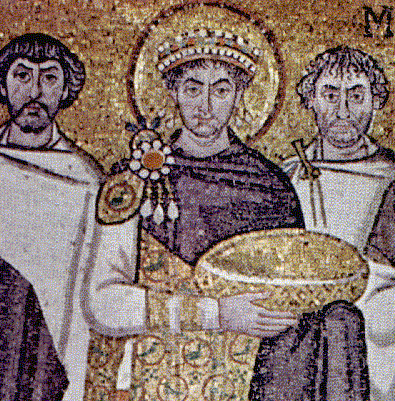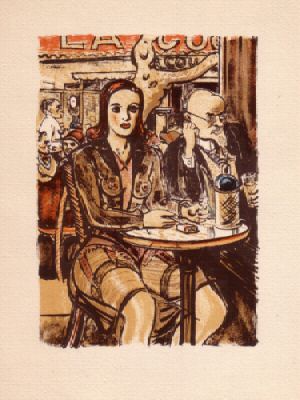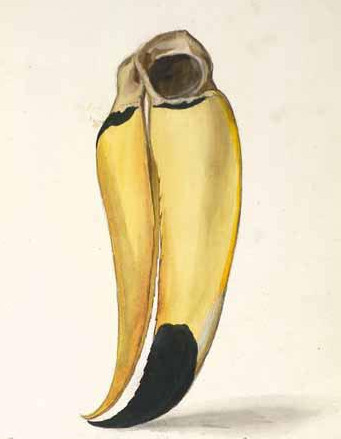Why President Bush is an (Accidental) Homeric Bard
Oh, yes, the president is the latest in a long line of men whose function through out history is to guide us, to lead not our swords but our minds, to make light what was dark, to illumine the very recesses of our souls and our humanity. The first--that we know of--was Homer himself, the original poet. From him to all others. But the epos, his particular form, held for Homer something of a stock palette, from which he was obliged to make his pictures in our minds. The epic poems were originally recited in the halls of one of the great cheiftains of the Aegean--in Thebes, or Sparta, Athens, or Corinth, on Crete or in Lydia, in Thrace or Cappadocia--and they were were spontaneous. The story was the same, a tale of heroes and gods, this famous battle or that explanatory myth, but the details had to be sung out anew each time, and the meter had to be kept--the epics were paratactic. There are certain epic conventions and stock phrases that can be recited and stiched together so that the bard might keep the story moving when there isn't much to say until the next battle. That is exactly where the president comes in.
You see, for many of Homer's, the president has his own stock phrases.
Homer used to say certian descriptive things consistently until they became cliches like "rosy-fingered dawn" and "wine-dark sea" They are still among the most wonderful descriptive phrases ever penned and are used often to set the scene. President Bush never says anything without invoking 9/11 or the "War on Terror" or explaining that "they hate our freedom". In the Homeric tradition one refers to the "Argives of the long grieves" or the "Trojans, breakers of horses" these simple identifiers keep the meter and make the description of essentially simplistic divisions more interesting. The President has his own: "Evil-doers" and "nay-sayers" 9the later for his political enemies) come to mind. Homer had the great description of Achilles' Sheild--another epic convention, where in the description of a pivotal object becomes an allegorical story in itself. The President--well he's never described much of anything, so we're giving this one to Homer. But the epic always had intervention from the gods, which is apparently what Bush thinks is going to save us all, literally. Homer has his famous list of ships and men that come to Troy, or the list of men that Odysseus meets in the underworld--the president has his own epic list for the "evil-doers": "They've killed in Madrid, and Istanbul, and Baghdad, and Bali, and London, and Sharm el-Sheikh, and Jerusalem, and Tel Aviv." And where Homer would give appropriate little pseudonyms to his heroes like "Death-dealing Achilles", George Bush gives nick names to his heroes, like "Brownie" who does "A heck of a job".
Virgil wrote the first mock epic, but Bush is the first mockery of an epic poet. The bard used these conventions in the interests of both formalism and because they are essentially filler. The President just doen't have anything else to say. If Homer had eyes to see, he would surely weep. The gods, as always, just sneer.
You see, for many of Homer's, the president has his own stock phrases.
Homer used to say certian descriptive things consistently until they became cliches like "rosy-fingered dawn" and "wine-dark sea" They are still among the most wonderful descriptive phrases ever penned and are used often to set the scene. President Bush never says anything without invoking 9/11 or the "War on Terror" or explaining that "they hate our freedom". In the Homeric tradition one refers to the "Argives of the long grieves" or the "Trojans, breakers of horses" these simple identifiers keep the meter and make the description of essentially simplistic divisions more interesting. The President has his own: "Evil-doers" and "nay-sayers" 9the later for his political enemies) come to mind. Homer had the great description of Achilles' Sheild--another epic convention, where in the description of a pivotal object becomes an allegorical story in itself. The President--well he's never described much of anything, so we're giving this one to Homer. But the epic always had intervention from the gods, which is apparently what Bush thinks is going to save us all, literally. Homer has his famous list of ships and men that come to Troy, or the list of men that Odysseus meets in the underworld--the president has his own epic list for the "evil-doers": "They've killed in Madrid, and Istanbul, and Baghdad, and Bali, and London, and Sharm el-Sheikh, and Jerusalem, and Tel Aviv." And where Homer would give appropriate little pseudonyms to his heroes like "Death-dealing Achilles", George Bush gives nick names to his heroes, like "Brownie" who does "A heck of a job".
Virgil wrote the first mock epic, but Bush is the first mockery of an epic poet. The bard used these conventions in the interests of both formalism and because they are essentially filler. The President just doen't have anything else to say. If Homer had eyes to see, he would surely weep. The gods, as always, just sneer.






0 Comments:
Post a Comment
<< Home